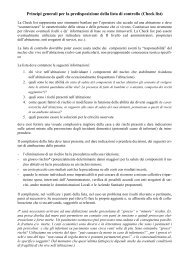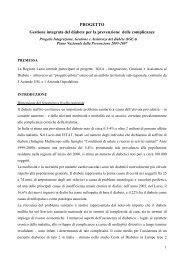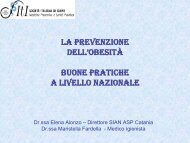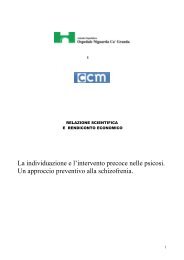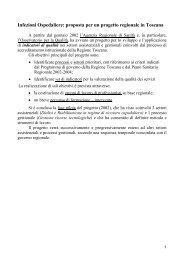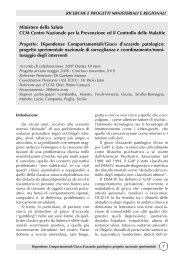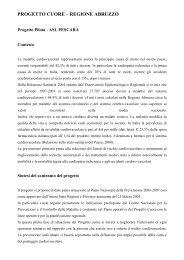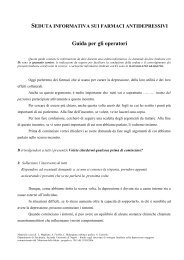Gaining health : analysis of policy development in European ...
Gaining health : analysis of policy development in European ...
Gaining health : analysis of policy development in European ...
You also want an ePaper? Increase the reach of your titles
YUMPU automatically turns print PDFs into web optimized ePapers that Google loves.
Policy formulation<br />
This section discusses the <strong>in</strong>formation and evidence on<br />
which <strong>policy</strong> formulation is based, the key players, the<br />
mechanisms and processes employed, and the tasks undertaken.<br />
Information for <strong>policy</strong> formulation<br />
In the countries studied, <strong>in</strong> addition to the so-called “hard”<br />
data on epidemiology and <strong>health</strong> resources, we were able<br />
to draw on the expertise and experience <strong>of</strong> those <strong>in</strong>volved<br />
<strong>in</strong> the process, political directions from <strong>policy</strong>-makers, <strong>in</strong>formation<br />
from <strong>in</strong>ternational organizations and other countries<br />
and, <strong>in</strong> some cases, other “s<strong>of</strong>t” <strong>in</strong>formation on attitudes<br />
and op<strong>in</strong>ions.<br />
Epidemiological data<br />
As could be expected, basic epidemiological data constituted<br />
an essential <strong>in</strong>put to <strong>policy</strong> formulation <strong>in</strong> all case-study<br />
countries, although there was wide variation found <strong>in</strong> its<br />
availability. Given the short time frame frequently imposed<br />
by politicians, this was based ma<strong>in</strong>ly on the gather<strong>in</strong>g and<br />
process<strong>in</strong>g <strong>of</strong> exist<strong>in</strong>g knowledge and less frequently on<br />
new research.<br />
Mortality data accord<strong>in</strong>g to <strong>in</strong>ternational classification are<br />
available across Europe and can frequently be disaggregated<br />
by age, gender and geographical area (even, <strong>in</strong> some<br />
countries, reach<strong>in</strong>g down to postal districts or political<br />
constituencies. Much <strong>of</strong> the basic data <strong>in</strong> F<strong>in</strong>land can be<br />
l<strong>in</strong>ked to a personal identity number and it is even possible<br />
to l<strong>in</strong>k different databases, allow<strong>in</strong>g for extremely sophisticated<br />
<strong>analysis</strong>. Regional differences are frequently referred<br />
to <strong>in</strong> the policies <strong>of</strong> countries where equality <strong>in</strong> <strong>health</strong> is<br />
high on the agenda, though gender differences seem to be<br />
given less attention. In other countries, such as Albania and<br />
Kyrgyzstan, concerns rema<strong>in</strong> over the validity <strong>of</strong> even basic<br />
mortality data; there are considerable deficiencies <strong>in</strong> the<br />
<strong>in</strong>formation system, and data collected by different <strong>in</strong>stitutions<br />
are not always consistent or comparable.<br />
Information on NCD morbidity is less complete. There is a<br />
degree <strong>of</strong> fragmentation and a lack <strong>of</strong> standardization, and<br />
surveys are <strong>of</strong>ten carried out on restricted populations,<br />
sometimes without systematic statistical sampl<strong>in</strong>g. The<br />
result is that clear trends <strong>in</strong> the prevalence and <strong>in</strong>cidence <strong>of</strong><br />
NCD at population level cannot be described.<br />
F<strong>in</strong>land, Lithuania and, more recently, Ireland have carried<br />
out regular surveys on lifestyles and behaviour for many<br />
years and are able to utilize <strong>in</strong>formation on long-term<br />
trends for <strong>policy</strong> purposes. On the whole, however, WHO<br />
surveys <strong>in</strong>dicate that such <strong>in</strong>formation is less widespread<br />
than mortality data, particularly <strong>in</strong> relation to socioeconomic<br />
characteristics. In all <strong>of</strong> the countries exam<strong>in</strong>ed, there are<br />
some data on CVD risk factors and partially on those for<br />
cancer. At least smok<strong>in</strong>g prevalence, cholesterol and blood<br />
pressure levels and body mass <strong>in</strong>dex are observed <strong>in</strong> most<br />
<strong>of</strong> the countries <strong>in</strong> a more-or-less systematic way, though<br />
not always at national level and sometimes reported rather<br />
than actually measured. Information on alcohol consumption<br />
is less satisfactory. In practically all observed countries<br />
there is a fair description <strong>of</strong> nutrition based on household<br />
statistics, food balance sheets and commercial data. Information<br />
on physical activity, which is less easy to observe,<br />
is more superficial. Much <strong>of</strong> the <strong>in</strong>formation collected is<br />
limited to leisure-time physical activity, fail<strong>in</strong>g to reflect the<br />
enormous impact on physical activity <strong>of</strong> changes <strong>in</strong> the<br />
workplace, transportation and urban plann<strong>in</strong>g. Albania,<br />
Greece and Kyrgyzstan are particularly short on such data.<br />
The role <strong>of</strong> the WHO was crucial <strong>in</strong> standardiz<strong>in</strong>g data <strong>in</strong><br />
F<strong>in</strong>land and Lithuania, for example, <strong>in</strong> the <strong>in</strong>itial stages <strong>of</strong><br />
tackl<strong>in</strong>g NCD. Together with that <strong>of</strong> the EU, WHO’s role<br />
is still vital, particularly <strong>in</strong> countries with less sophisticated<br />
<strong>in</strong>formation systems. The CINDI programme and MONICA<br />
Project have been particularly <strong>in</strong>fluential <strong>in</strong> the participat<strong>in</strong>g<br />
countries, ensur<strong>in</strong>g the production <strong>of</strong> regular, systematic<br />
Chapter 5<br />
223<br />
Reflections on experiences



